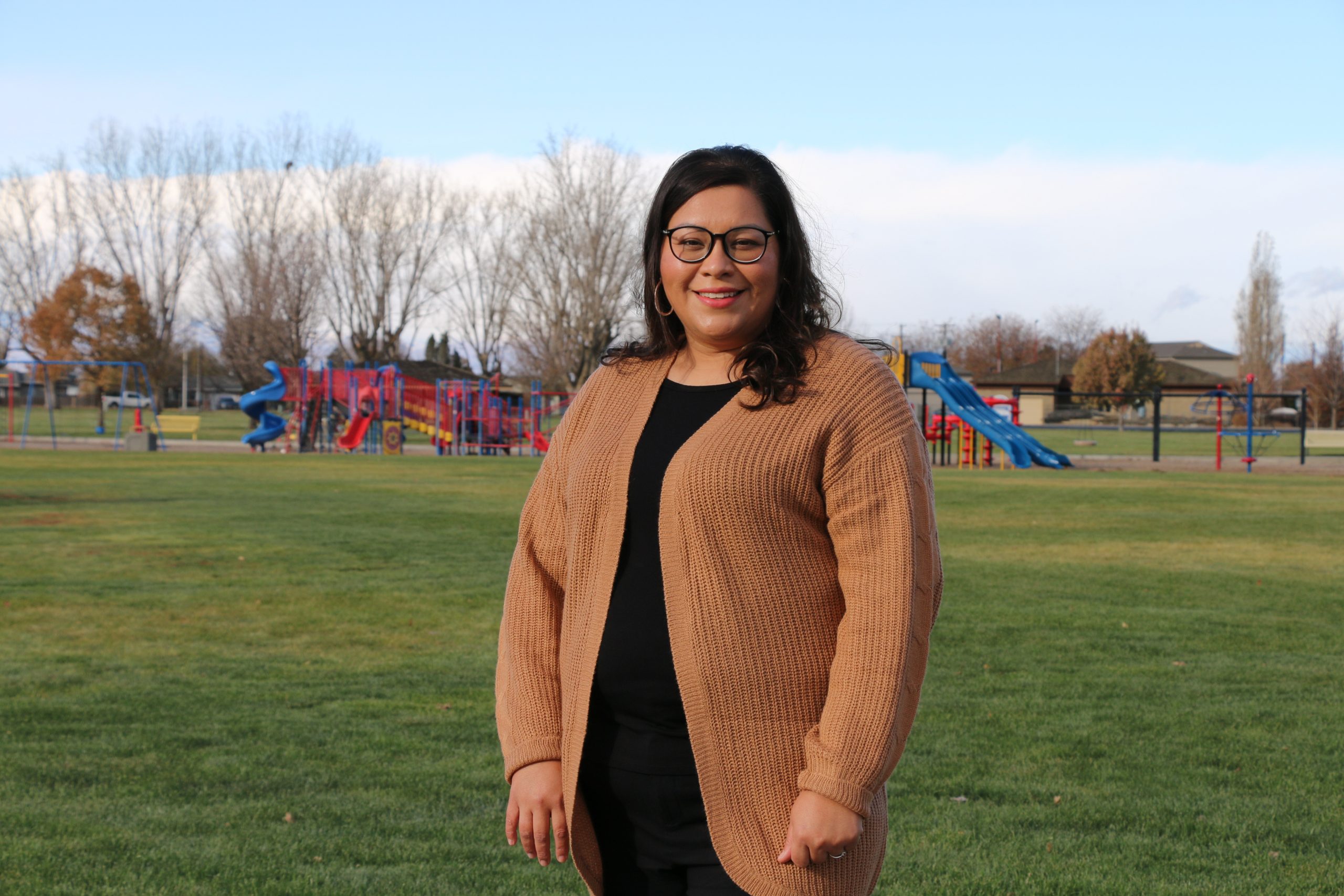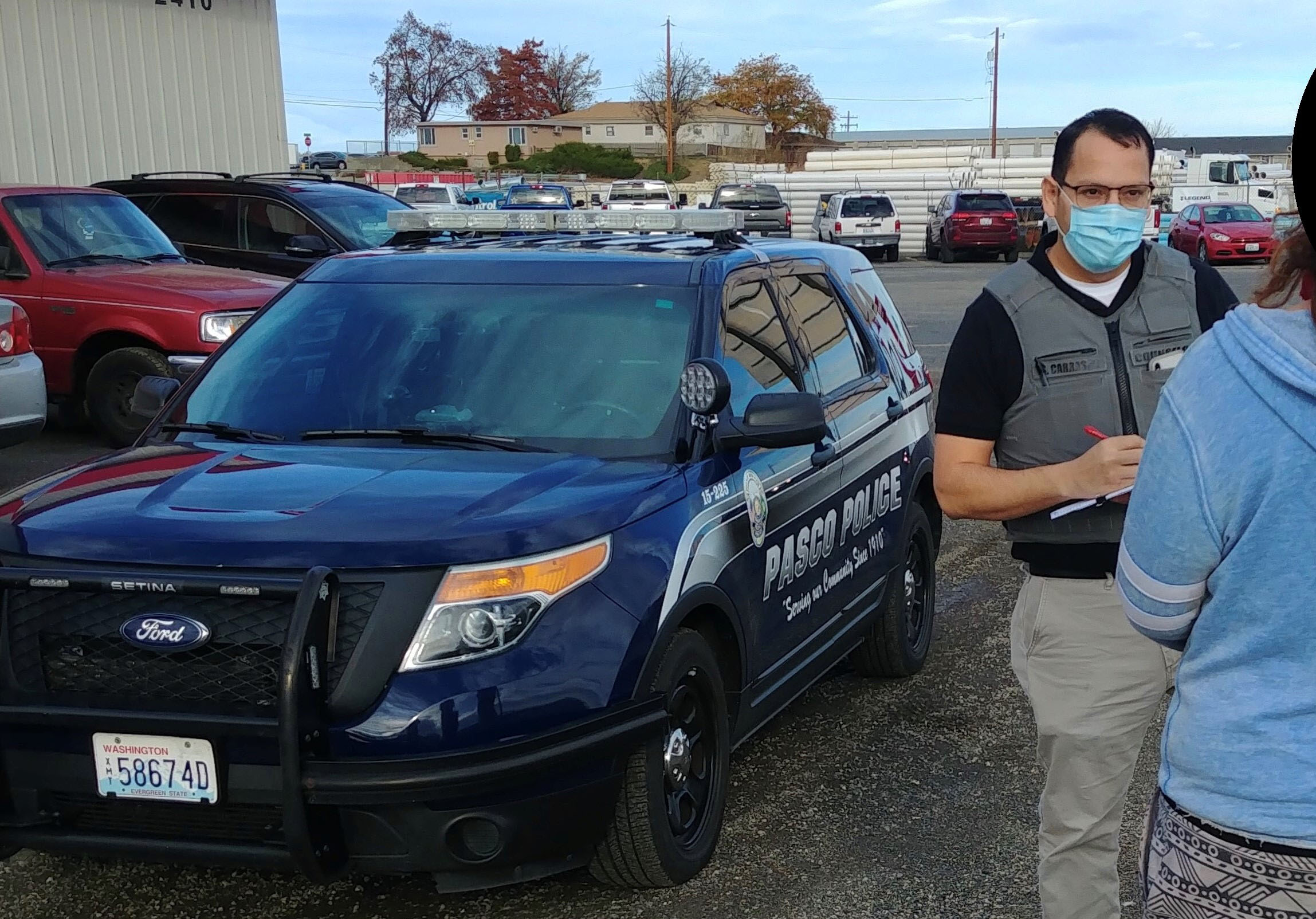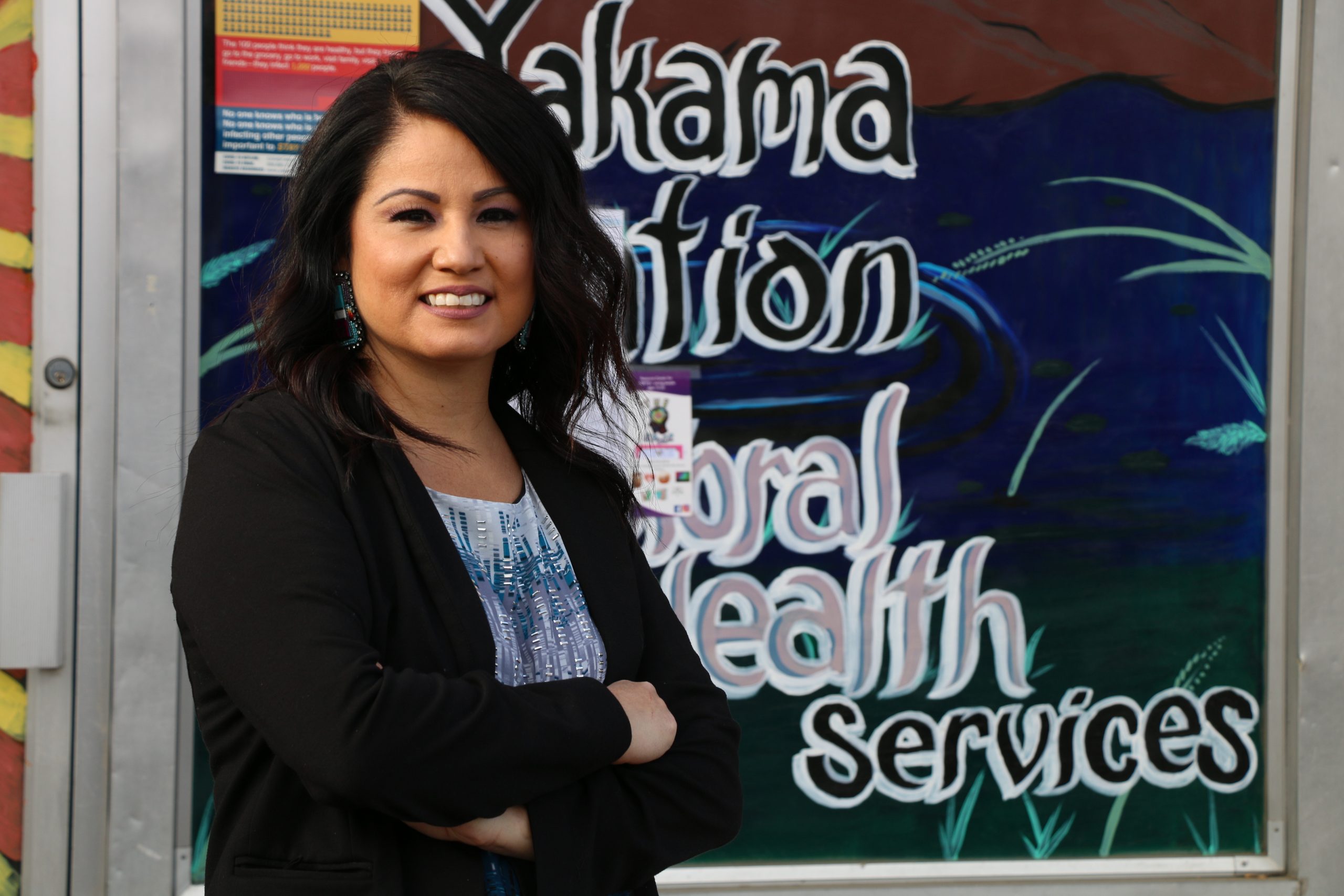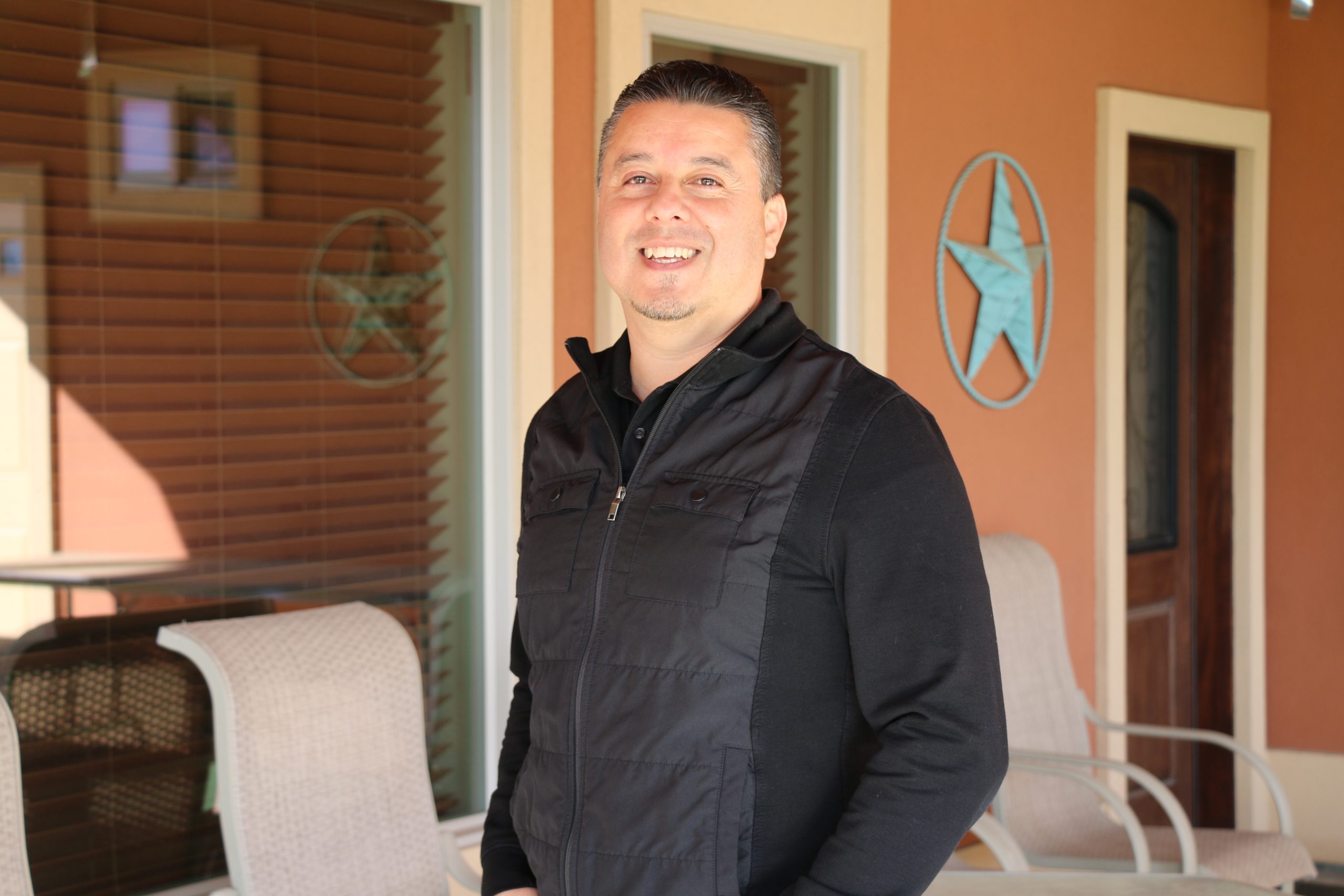Heritage Grads Here to Serve
Social work is one of Heritage’s most popular majors, with 146 students currently enrolled in the program. The bulk of these students remain in their hometowns after graduation, where they tackle some of their communities’ most pressing issues: homelessness, healthcare, children and family services, mental health and criminal justice, to name a few. Heritage social workers are found in virtually every specialization and in a wide array of agencies throughout Washington state. Here are a few of their stories.
OLGA ZUNIGA – “ONE STUDENT AT A TIME”

Olga Zuniga’s social work career led her back to the elementary school where she was once a student.
Olga Zuniga took on the role of caregiver when she was still a child. Her parents were migrant farm workers and they needed her to care for her siblings.
As an adult, after her youngest son’s premature birth, it was she who needed help. His medically fragile condition necessitated she live near the hospital for three months.
There, she met a woman who would be her lifeline: Anna, a hospital social worker who helped her with temporary housing, meals, and child care for her other children.
Three years later, her son was thriving, and she was ready to return to work.
“That’s when I thought about my experience and what a difference a social worker made for me,” she said. “I realized that was my calling.”
Many who decide to go into social work do so out of a strong desire to give back, said Corey Hodge, chair of the Social Work Program at Heritage.
“Everyone who chooses to pursue a degree in social work is there for a reason,” said Hodge. “Many have had someone in their lives who believed in them and helped them, and they want to give back.”
Heritage’s social work program has graduated more than 500, and Hodge said almost all have remained in the Yakima Valley. They work for the state and for non-profit organizations. They work in rehab centers and health care, for victims of domestic violence and substance abuse.
The work done by these Heritage University alumni and hundreds of others has effects throughout the region.
For Zuniga, that calling she felt brought her back to her roots. She’s a school social worker, and the building she works out of used to be her elementary school. She is seeing a lot of insecurity around food and housing among her students.
“We have students who may not have breakfast or dinner and students whose families are homeless.”
Sometimes traumatic experiences are deeply embedded in children’s lives. That’s when a social worker taps more comprehensive service providers.
She works regularly with food banks, financial assistance programs, housing assistance programs, mental health providers, medical providers and crisis intervention programs. She calls them “lifelines” for the students she serves.
“Our job is never done. But we make progress, one student and one family at a time.”
SALOMON CARRASCO – “YOU LISTEN”
Salomon Carrasco has counseled a lot of people in distress. Sometimes it’s the result of mental illness, sometimes drug use or alcohol abuse. He’s worked at treatment centers and at the Pasco County Jail.
It’s helped make him effective in his current role. Carrasco spends each workday riding with Pasco police officers as a Designated Crisis Responder, in a cooperative effort between his employer – Lourdes Crisis Services – and the Pasco Police Department.
The program’s goal is to identify repeat offenders, de-escalate crises, get people off the streets, and get them help.
Washington’s Tri-Cities area has three DCRs in total – one in each of its three cities of Pasco, Richland, and Kennewick. This “Mobile Outreach Team” works with all nine law enforcement agencies in Benton and Franklin counties.
Every weekday following the daily shift briefing, Carrasco hops in a patrol car with whichever officer he’s assigned to shadow. Whenever a mental health or behavioral health-related call comes in, the officer turns the vehicle toward the problem.
Once on the scene, Carrasco talks with family members and assesses the client. His goals are to establish safety, offer resources, and run through a plan should concerns arise.
If the client needs treatment, Carrasco calls ahead to Lourdes. Once there, the client receives care immediately, which wasn’t previously the case.
Sometimes situations are more acute – and possibly threatening. Then, police officers, who are trained to make initial contact, secure the area around the client, and engage Carrasco’s expertise.
“I look up their history, and I evaluate the individual: Are they of potential harm to themselves or others? Are they making threats? Do they understand what they’re doing? I can counsel them and de-escalate the situation.”
The client can talk to the police officer or to him, Carrasco said. “Some people are afraid I’m going to put them in a psych ward. But some see me as a counselor, and I am.”
Back at precinct headquarters, another critical part of Carrasco’s work is participating in training law enforcement on the psychology and process of de- escalation.

Salomon Carrasco goes out on calls with the Pasco Police Department to provide mental or behavioral health assessments.
“We talk about introducing yourself and tell them you’re there to help them. You listen, keep good eye contact, stay calm, express empathy, acknowledge their concerns, and just allow the person to vent without interrupting.”
The joint effort has helped Pasco meet its goal of decreasing incarceration at a time when mental health issues have increased. Pasco police refer an average of 50 clients to the Mobile Outreach Team every month.
“It’s working,” said Carrasco. “We’re seeing people who need help getting connected with resources having fewer interactions with police, and sometimes eliminating those interactions entirely.”
Lourdes has funding to continue to provide the service through 2020. Carrasco said Pasco city commissioners are talking about how to get funding if Lourdes doesn’t get re-funded in 2021.
“Because it’s making a difference,” said Carrasco.
CYNTHIA JONES – “HEALED PEOPLE, HEAL PEOPLE”
In her youth, Cynthia Jones made what she calls a series of poor choices, including dropping out of high school and abusing alcohol.
But at age 17, while living in Seattle, Jones saw an ad for a community college. She took the bus there, met with an advisor, and told her she wanted to enroll though she had no income.

Cynthia Jones helps Yakama women, teens and children break the cycle of the adverse effects of generational trauma.
The advisor gave her a business card. On it was the name and phone number of a social worker who had funding for Jones for everything from bus tickets to tuition and childcare.
“She was my salvation,” said Jones. “I knew right there I wanted to do something like what she did.”
For those who decide to go into social work, it’s often about giving back in appreciation of what others did for you.
Jones credits many with helping keep her on her path, including fellow students and faculty at Heritage where, in addition to her full-time job, she now teaches as an adjunct professor.
“When my youngest was born prematurely, my classmates took notes for me and would check on me, and my instructors would always say, ‘Don’t let not having childcare keep you from coming to class.'”
Heritage instructor Gregorio Ochoa was one of those people Jones met who made it his business to help other people. She calls him an “old-school” social worker.
“He’s the male version of Mother Theresa,” said Jones. “He went to the people, and he spent time with them. I wanted to be like him.”
After graduating from Heritage, Jones went to work as a vocational rehabilitation counselor with the Yakama Nation. She did job skills training and helped her clients find jobs, at the same time she also pursued a master’s degree.
In 2017, she was offered a position with Yakama Nation Behavioral Health as a behavioral health therapist. She provides one-on-one mental health counseling to women, teens and children experiencing trauma, depression and anxiety.
She said an essential part of her work is helping clients understand that the losses their people have endured affect their lives today.
“Children were taken away, women were sterilized, we couldn’t speak our language, and we continue
to bear the legacy of this. We’re in a time of healing now, but we can’t help ourselves until we understand this societal trauma.
“After that, we start to work on the personal trauma,” said Jones. “You need to be with the person and their story. You need to hear it, really hear it – and you also have to help them see the good they have been able to do. I ask people, ‘What are your strengths? How is that you’re still here?’ And I tell them the blood flowing through our veins is that of the resiliency of our ancestors, and that we honor them by doing good. I work to communicate a sense of strength and pride that can build hope.”
Jones often incorporates Native spiritual practices into therapy. “We start with prayer, with a moment of silence, lighting sweetgrass or sage or a candle.”
She said it’s important for people in social work professions to make sure they’re OK, too. She releases her day by spending time in her garden – what she calls her “place of healing.”
“Before we can help others, we have to heal, and that can be a long process.”
Jones recalls visiting a homeless encampment on the Yakama reservation years ago. She saw someone she ran away with when they were teens.
“I remember thinking, ‘That could have been me.'”
Other people from the past show up from time to time, too — people whose lives she helped make better. To this day, she said, people stop into her office at Vocational Rehabilitation looking for her. They want to tell her how they’re doing, that they’re still at the job she helped them get or they’re still drug-free. They want to thank her.
“I think about how it’s one thing after another that leads to where you end up. The difference for me was that I was I’ve had people who care.
“I’ve been able to heal. And healed people heal people.”
LEO LÓPEZ – “I’M HERE TO SERVE.”
Leo López loves remembering the way his dad met people.
“He’d always say, ‘Mucho gusto. Lionel López – aquí para servirte.’ It meant, ‘Happy to meet you. I’m here to serve,’ “It’s how he lived his entire life,” said López.
López learned early on the impact one caring person could have on many people.
Growing up in a close-knit family, López started working in the fields and orchards at age four. Migrant students’ education included “migrant school” – several hours every day after the other students went home – to make up for the time they had been out working.
It was extra time and attention that ensured he had a quality education.
After high school, López knew he wanted a job working with children. He enrolled at Heritage, deciding to pursue a degree in social work. Washington state didn’t have school social workers in 1990, so López went into juvenile rehabilitation, working with adjudicated youth ages 12 to 21.

Leo López’s career helping children took him from Washington state to Washington, DC and back again.
It was an eye-opener, more a criminal system than rehabilitation, he said. He learned that systems sometimes don’t serve the people in them very well.
He got his master’s degree and, in 1999, got a job with Head Start’s Migrant/ Seasonal program in their Washington D.C. headquarters. Head Start is a national organization that promotes the school readiness of preschool-aged children from low-income families.
It was in this role that López began to be able to impact more far-reaching improvements in systems affecting children.
“It was all about engaging families and encouraging them to work at what they want for their children – specifically a good educational foundation and keeping them in school,” said López. “This program made sure that wherever a family migrated to, children wouldn’t lose the credits they’d earned toward the grade placement they were at.”
Working with an organization he knew made a difference in children’s lives – children with a background just like his – López felt life had come full circle.
López wasn’t looking to leave Head Start in 2007 when he got a call from friends about a job that seemed tailor-made for him. It was in Yakima – a short commute from his home base of Sunnyside – and, once again, he’d be doing meaningful child- centric work.
Today, López is director of Casey Family Programs’ Yakima office, a national organization whose focus is to reduce the number of children in foster care in the U.S.
Working closely with Washington’s Department of Children, Youth and Family, López and his staff of 17 – mostly master’s-level social workers – are responsible for Casey’s work throughout the state of Washington.
He said some of his most rewarding work is with the Yakama Nation’s Nak-Nu-We-Sha foster program. He admires the way it weaves Yakama culture into its practice with the individual children and families it serves. Understanding a community is something he said is key to any social service program’s success.
There’s high-level interaction in the job as well. López works closely with consultants and lawmakers in New York, Washington, D.C., and Atlanta. He guides partnerships with multiple states and jurisdictions on research that affects public policy.
He’s even developed training for the Mexican Consulate and the Washington State Department of Children, Youth and Families (DCYF) that helps reunify children with their families in Mexico and parts of the United States.
López said he sees every day the ways positive change can happen on the micro and macro levels.
“I do think it begins with that one person who believes they can make a difference. For me, it started with what I saw every day at home – though I don’t feel I’m even close to what my dad did every single day. But I keep trying.”
